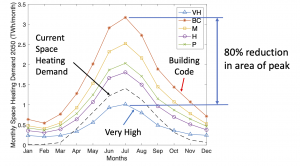ECCD’s Dr Ben Anderson with Dr Michael Jack and Prof. Janet Stephenson from the University of Otago recently submitted a response to the New Zealand Climate Change Commission’s consultation on its first package of Advice to government. The submission focused on the results of modelling the impact of energy efficiency on space heating demand and, in particular, the finding that retrofitting New Zealand’s homes to the highest currently commercially viable energy efficiency level (PassivHaus) would reduce winter heat demand by up to 80% in peak winter months.

Monthly space heating under a range of building efficiency scenarios in New Zealand
Since future space heating In New Zealand is likely to be driven by electric heat pumps, this would significantly reduce winter demand for electricity for heat in contrast to the current assumption that it would substantially increase.
The model also suggests that such energy efficiency could reduce the difference between summer and winter peak electricity demand by up to 75%. Not only would this make the transition to a ~100% renewable electricity system substantially easier (and therefore cheaper), it may also help to resolve the known ‘dry year’ problem that causes a seasonal mismatch between high run-of-river hydropower generation resource (spring snow melt) and winter heat demand.
Together these results suggest that aggressively reducing space heating demand through both improved new builds and high quality retrofit of the existing stock would substantially reduce the costs of the low carbon transition by avoiding excessive over-investment in supply side infrastructure. This would directly support the Commission’s “Principle 4: Avoid unnecessary cost”.
Further details:
